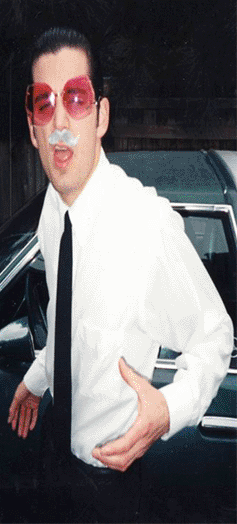
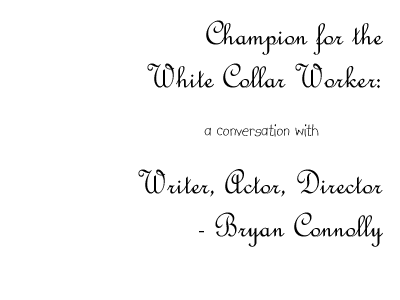
Connolly takes a break on the set of
The Great American Disease
[This interview originally appeared in - Don't Bite the Pavement - a column devoted to film and video in the Toby Room: Art, Culture, and Life in the South Sound paper, issues 6 and 7, 2003, published in Tacoma, Washington.]
Bryan Connolly, transplanted to the Northwest from Long Island at the tender age of 4, is an Olympia-based filmmaker. Foregoing the
well-intentioned wishes of his parents to study law or medicine, he's dared to pursue that he loves and is most passionate about. Currently, he is attending The Evergreen State College, collaborating with other filmmakers through group contracts, while continuing to develop scripts and make work on his own.
In addition to writing, acting and directing since his early teens, Connolly's also held a steady job for the past 8 years - employed
part-time at an office that has become a central motif in his narrative films to date. These dark comedies, shot on video, include Elevator (1998, 15 mins), The Great American Disease (2001, 85 mins) and a 30-minute pilot (edited for television broadcast) called The Savage Place (2002).
Each of the stories is infused with an innate sensibility for depicting the condition and plight of the White Collar Worker. Through the
characters and environs, internalizations of monotony, displacement, loneliness and loss are exteriorized, delivered in a slapstick kinda way.
Bryan is adamant about sacrificing the income a full-time 40-hour-a-week job may provide for having ample time to do his own work. He believes in having just enough money to get by on so he may dedicate the majority of his time and energy to writing and filmmaking, adding that he isn't above flipping burgers if he has to, that no artist should be...
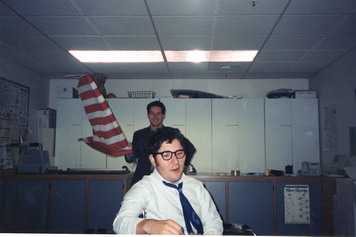
actors, Eric and Chris, on location: The Great American Disease
PART ONE:
"Working 9 to 5, what a way to make a livin'..." - Dolly Parton
Bridget Irish: The reason I wanted to interview you for this issue [TR #6] - Day and Night Jobs - is because the office space that you use in your films is the same office in which you've been working since you were 12.
Bryan Connolly: Yeah, since the end of the 8th grade. It was my first after-school job and it's still my after-school job in college. I don't know if that makes me a loser or more responsible that I can hold a job for that long.
Why would you consider yourself a loser for -
BC: I don't know - just doing the same thing for that long, something that's fairly simple - that anyone can do really. I mean - I've gotten a lot better, I mean, I've been doing it since I was 12 so I can do it a lot faster than if they were to hire someone new and I kinda have the routine down. I know everything about every employees work place and it's easier for me to move around. I can get stuff done really quickly. But it just seems kinda easy, easy stuff. I don't know.
Where is it that you work?
BC: It's my father's engineering firm - Skillings/Connolly, in Lacey, Washington.
What is it that you do exactly?
BC: I do, uh, I don't know - clerical - I guess is what you can call it. It's a lot of filing and running up stairs, finding old files and filing new files and making the file folders for new files and making, you know, photocopies. Most of my time is spent in the copy room, which is also the kitchen, so I can eat food and drink coffee and just kinda copy papers for hours on end.
Are there any other kinds of jobs you've had?
BC: Only one other paying job - I was working at a movie theater for three months, at the mall. It was terrible.
You say "paying job" - what other kinds of jobs have you had?
BC: I mean, I've done things for people, people who need help making movies where I would just show up everyday and help them, like a job, but I don't get paid for it, it's just fun stuff.
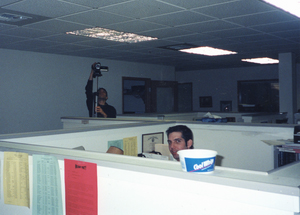
actor, Zack Carlson, on location: The Great American Disease
[ interviewer's note: I'm interested in exploring the socio-philosophical aspects of Bryan's films, particularly those which involve the everyday monotony of the Office, but am having trouble articulating a question that may take the discussion in that direction... ]
...there seems to be these underlying themes or subtext in your pieces having to do with a sort-of cubicle-ized mentality, you know, the cubicle space, the office...
BC: I've always been interested in the cubicle. I, myself, don't actually work in a cubicle. I have a little table corner nook that actually, see, well, I've had different offices, they're not even really offices. I never have my own office - I just have a desk in someone else's office, it's not even really a desk...I used to have a table in the office of this one woman and people tend to use my table for storing other things. So, I kinda have this table I can't use but I can have a chair to sit in, at least, in front of this table, and clean little spaces for where I can work. So, mostly, I don't sit where my desk is and I, uh, just kinda move back to the kitchen, where the copy machine is and spread it out on a table there.
There are these two big tables and I work there until lunchtime, then I have to move somewhere else because then everyone uses this space for lunch.
So I'm constantly moving around doing work. When I actually do work that requires laying something out in front of me. So yeah, there are four different places in the office I can move to and work there til someone needs that space - then I move to the next place.
I wish I had a cubicle, then I'd have a space to work in. But it's kinda nice not being surrounded by big carpeted walls.
Is it out of convenience that you use...
BC: That I use the office to film stuff in?
Though I see more to it - that underlying subtext - I see it being relative to your own life.
BC: It's not really convenience because I'll write it and I won't be thinking - oh I'll just write it about an office because that's where I work. I also have as much access to a college or my house or my dad's truck, my parent's house, a pool table... but I don't use any of those things.
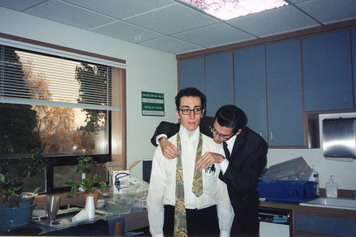
Bryan with Lucas, on location: The Great American Disease
There seems to be a pre-occupation with the condition of the White Collar Worker.
BC: Yeah, I guess. I mean, I've been doing it since an
impressionable 12 year old to being a young adult, from 12 to 22 - that's a long time to be working in one spot. And noticing people that have worked there the whole time you're there and the people who come and go. I mean, I don't hate working there. I really like it. And I don't hate my bosses and I don't feel, I mean, like you see a lot of movies about working in cubicles, a dull boring workplace, but I find it kind of exciting. I like losing myself in busy work, like paperwork, sitting in front of the copy machine.
What's nice about my job is I'm not the one writing all the numbers down, doing all the math and working with clients - I'm just doing busy work, where I can be thinking of other things while I'm doing it and what I usually think of is all my movie ideas, but since I'm at work usually it just ends up being ideas of movies that would take place, like, there. Like, wouldn't this be funny if this happened while I was at work here. I'm sure if I had this job where I just chopped wood all day, in the middle of some forest, I'd just end-up making movies about that - because you're there all day.
I think with Savage Place, which is about lack of work and just kinda sitting around, people eating food and being sent home early and just kinda sad by the fact that there's nothing to do - I feel that - I hate it when there's nothing to do and I'm just sitting around. Part of me wants to go home and just do nothing because I figure I'm not doing anything here, I might as well go home. But then I kinda wish there was something to do. It passes the day faster when you have work - no matter if it's terrible work, fun, or what - if you're busy it eats time up, makes 5 o'clock come sooner.
Next question!
When we were talking about this 40-hour-a-week structure, the 9-to-5 life, it was actually the mention of Wednesday as "Hump Day" that you started talking about your favorite day of the week -
BC: Thursday!
Could you talk a little more about that?
BC: Why Thursdays? Well, if you go through the week, starting with Friday, well, you know, Friday's a good day because you get to do all this fun stuff, same thing with Saturday and you don't have to worry about work or school usually and then Sunday comes around and on Sunday you start to think about the stuff you should have been doing Friday and Saturday but you didn't do. You're like - I had all this time and I didn't do this this this and this... so, Sunday's just kind of a bummer because of that, like - I wish I did all this, where did the weekend go? Like right now - it's Sunday - what did I do? I did some fun things but I could have been more
productive and I never am and then, like, next weekend, it just cycles all over again. Sunday's also the day where you're like - oh, I gotta go to work tomorrow so I might as well not do anything fun today, I might as well take it easy just like I did Friday and Saturday. And then Monday comes around and you're at work and you're like - Monday, oh. You know. Monday is the beginning of the week and the weekend's so far away. Garfield hates Mondays. Then Tuesday is just like another, not as bad as Monday but it's still another day where you're at work or school whatever and then Wednesday - Hump Day. Not hump because of sex, but hump because it's in the middle of the week. Wednesday is a little exciting because it's like - ah, it's halfway over - but Thursday! the best day because Thursday you have nothing but the weekend ahead of you, even though you have to work on Friday. You're like - I have to work tomorrow but tomorrow night I don't have to do anything. Like, I don't have to go to bed early, I don't have to worry - it's Friday - I can stay up til 8 in the morning. Thursday's the best workday because you get through the day and you know you don't have to work the next day. Well, I don't have to work on Fridays. And Thursday's the day I usually plan out the rest of the week. Where it's like - it's Thursday - what am I gonna do? I've got all this time ahead of me and then - you know - you don't do any of it. You do maybe 2 of 8 things you'd planned by Sunday and you start over again. Thursday is fun. I usually stay up the latest on Thursday night.
Would you say what you do as a day occupation informs what you're making as an artist? A filmmaker?
BC: It probably does. I mean, it must. If you're doing something that much a week it's going to effect you in some way or another - whether you want it to or not.
- - - - - - - - - - - - - - - - - - - - - - - - - - - - - - -
STAY TUNED for Part Two - where Bryan shares with us such tidbits as: a traumatic childhood event that shaped the plot of The Great American Disease, and aspects of his filmmaking process:
"I come home with piles of notes that I just do on various sticky pads that I carry around with me in the office - basically any little piece of paper I can find in whatever room I'm working in. If I think of something I'll write it down and I just shove my... I'm sure my wallet's got some in it right now. Let's see what ideas I have in my wallet..."
- - - - - - - - - - - - - - - - - - - - - - - - - - - - - - -
2010 Update: Bryan currently lives and works in Austin, Texas.
- - - - - - - - - - - - - - - - - - - - - - - - - - - - - - -
Most Recent Film: The Savage Streets
New Book: Destroy All Movies! The Complete Guide to Punks on Film
Available for pre-order at Amazon
Bryan and co-editor Zack Carlson will be promoting the new publication at Fantastic Fest...
article
- - - - - - - - - - - - - - - - - - - - - - - - - - - - - - -
Last Update 09.2010
Film and Destroy Directory




